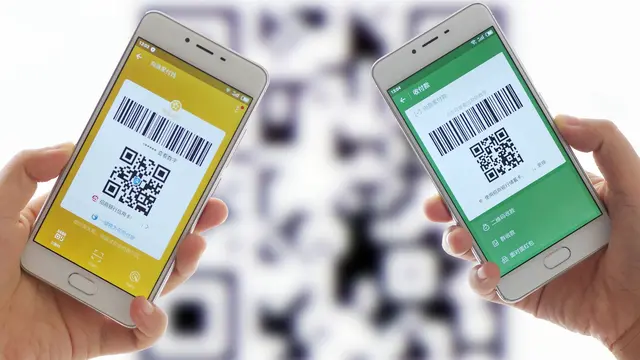'In five years, we will make most of the cities
cashless societies in China. Hangzhou, my city, is already a cashless
society, almost,” Jack Ma, founder and executive chairman of China’s
e-commerce giant Alibaba Group, made an ambitious claim during the
group’s Gateway 17 Conference in Detroit in June.
Alipay,
the mobile payment tool run by Alibaba’s affiliate Ant Financial, is
making all efforts to implement Ma’s plan in an escalating competition
with rival WeChat Pay, the other major third-party payment tool under
Chinese Internet titan Tencent Holdings Ltd.
Cashless Society Campaign
Alipay
launched a campaign named “Cashless Society Week” from August 1 to 8 to
encourage users to replace cash in all transactions in the week with
Alipay.
Of course, award money and coupons, which are
Chinese Internet companies’ talisman in recruiting users, are offered
in different amounts for each transaction.
(A
stand owner in a grocery market in Wuxi city, eastern China’s Jiangsu
Province offers Alipay and WeChat Pay QR codes for customers to pay.
/VCG Photo)
The campaign effectively expanded
its influence in wider audiences and areas. The number of mobile
transaction made by users at and above 50 years old surged about 10
folds year-on-year and the transaction number out of tier-1 and 2 cities
jumped 10 percent year-on-year, according to data Ant Financial sent to
CGTN Tuesday.
Meanwhile, Alipay’s rival competitor
WeChat brings enormous pressure when the latter enjoys fast growth
thanks to WeChat being China’s most widely-used instant messaging app.
In
fact, WeChat initiated a “Cashless Day” campaign back in 2015. This
year, when Alipay announced the “Cashless Society Week,” WeChat claimed
to expand its cashless campaign to the whole August and invited as much
as offline shops to join in.
Others swipe, we scan
Unlike
many developed economies’ high penetration of credit cards or bank
checks, China seems to have stepped over the period and become a
stunning leader in digital payment with a dramatic surge in a short
time.
In only three years from 2013 to 2016, the
total number of mobile transaction via the third-party payment platforms
skyrocketed more than 30 folds from 3.77 billion to more than 97
billion, according to official data from Payment and Clearing
Association of China.
Chinas’
mobile payment reached 5.5 trillion US dollars in 2016, almost 50 times
of the size of US market 112 billion US dollars in the same year,
according to data from consulting firm iResearch.
The
huge digital payment market has been carved up mainly by Alipay and
WeChat Pay with 54 percent and 40 percent respectively in the first half
of 2017, another iResearch report showed.
But they
adopted the same strategy: involving the end-users into its business
ecosystem as deep as possible. The two payment tools can complete every
single transaction in your life: purchasing online or offline, hailing a
car, booking a flight or train ticket, topping up your phone, paying
utility bills, transferring money to every account and even buying
various wealth management products.
Regulation to catch up
Nothing is perfect, neither is digital payment.
Currently,
the online payment via the third-party payment tools in China are
conducted directly between the payment tools and banks, bypassing the
central bank’s clearing system.
So the central bank
could not have detailed transaction information and capital flow and
there are rising concerns that the direct payment tools-bank connection
can be used in money laundering, credit cards cashing out and illicit
money transferring.
Therefore, the People’s Bank of
China, the country’s central bank, has required all banks and
third-party payment institutions to connect to a unified platform called
Nets Union Clearing Corporation (NUCC) by June 30 of 2018 to ensure
effective regulation and transaction security.
 简体中文
简体中文

